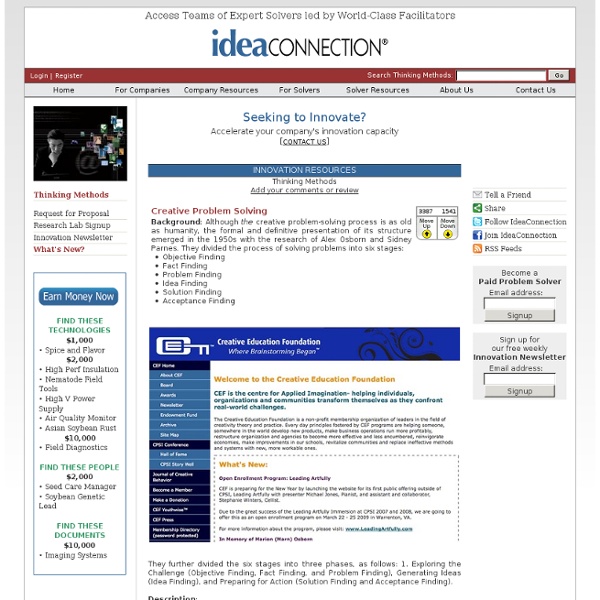Creativity techniques
Creativity techniques are methods that encourage creative actions, whether in the arts or sciences. They focus on a variety of aspects of creativity, including techniques for idea generation and divergent thinking, methods of re-framing problems, changes in the affective environment and so on. They can be used as part of problem solving, artistic expression, or therapy. Some techniques require groups of two or more people while other techniques can be accomplished alone. These methods include word games, written exercises and different types of improvisation, or algorithms for approaching problems. Aleatory techniques exploiting randomness are also common.
The de Bono Group - Six Thinking Hats
Used with well-defined and explicit Return On Investment success in corporations worldwide, Six Thinking Hats is a simple, effective parallel thinking process that helps people be more productive, focused, and mindfully involved. A powerful tool set, which once learned can be applied immediately! You and your team members can learn how to separate thinking into six clear functions and roles. Each thinking role is identified with a colored symbolic "thinking hat." By mentally wearing and switching "hats," you can easily focus or redirect thoughts, the conversation, or the meeting. Using Six Thinking Hats®, you and your team will learn how to use a disciplined process which will...
Synectics
Synectics is a problem solving methodology that stimulates thought processes of which the subject may be unaware. This method was developed by George M. Prince (April 5, 1918 - June 9, 2009)[1] and William J.J. Gordon, originating in the Arthur D. Little Invention Design Unit in the 1950s. History[edit]
SCAMPER technique training for lateral thinking
The SCAMPER technique uses a set of directed questions which you answer about your probortunity in order to come up with new ideas. The stimulus comes from forcing yourself to answer questions which you would not normally pose. The questions direct you to thinking about a probortunity in ways which typically come up with new ideas. SCAMPER is an acronym which stands for questions relating to the following: In essence you should ask yourself questions relating to each of the SCAMPER words to come up with new ideas.
Category:Creativity Techniques
This A to Z of Creativity and Innovation Techniques, provides an introduction to a range of tools and techniques for both idea generation (Creativity) and converting those ideas into reality (Innovation). Like most tools these techniques all have their good and bad points. I like to think of these creativity and innovation techniques as tools in a toolbox in much the same way as my toolbox at home for DIY. It has a saw, spanner, hammer, knife and all sorts of other things in it, they are all very useful, but you have to pick the right tool (creativity / Innovation technique) for each job.
Brainstorming
The Brainstorming (brainstorm) method is a semi-structured creative group activity, used most often in ad-hoc business meetings to come up with new ideas for innovation or improvement. Members of the group are encouraged to put forward ideas about a problem and how it may be solved, in order to generate as many ideas as possible, even if they are not always usable alternatives. The idea behind brainstorming is, that a group of people can achieve a higher (synergy) level of creativity than the sum of the participants separately. Brainstorming Rules



